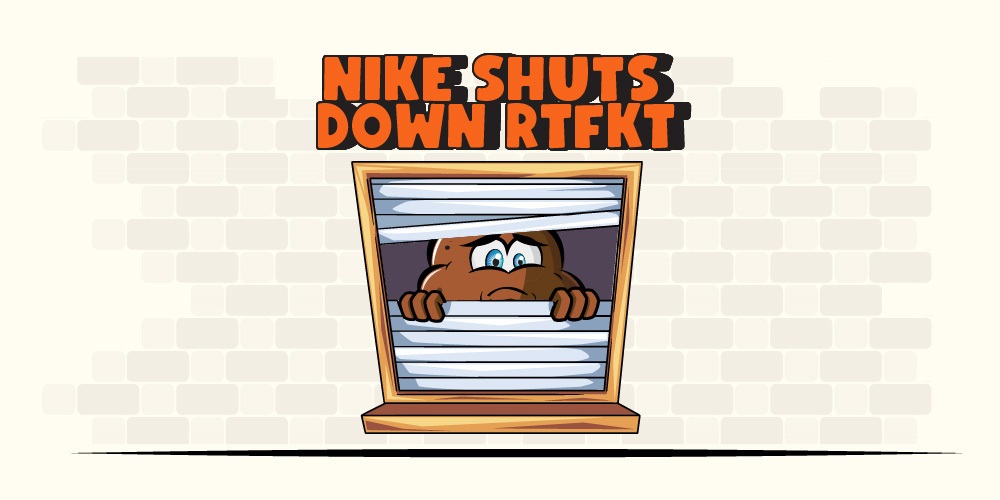Nike Shutting Down RTFKT Maybe 3 Years Too Late?
Imagine the excitement of delving into a world where athletic wear meets virtual reality. Only to find that the adventure is coming to a surprising halt. That’s the current scenario as Nike shutting down RTFKT is taking over news headlines. This isn’t just another brand but a pioneering leap into the digital fashion landscape that Nike decided to explore a few years ago. Now, as quickly as it rose to fame, it seems it’s time to say goodbye.
This partnership was the bridge between the sneaker culture and the boundless possibilities of the metaverse. Making this decision of Nike shutting down RTFKT even more shocking to everyone in the sneaker and NFT space.

So was this a strategic retreat or a simple business necessity? In this rapidly shifting market, being adaptable can mean survival or growth. To understand why Nike pulled the plug on RTFKT, let’s delve into the story of what was once a promising endeavor.
What Is RTFKT?
RTFKT, spelled “Artifact,” was founded in 2020, pioneering digital fashion by merging virtual and physical worlds through digital sneakers that could be made tangible. They expanded to include NFTs and collectibles for the metaverse, aiming to redefine digital fashion ownership.
By December 2021, Nike recognized the brand’s potential and acquired RTFKT as part of their digital strategy. Along its journey, the platform partnered with Nike on innovative projects like the Cryptokicks iRL, Air Force 1 NFTs, and the limited edition NEKO Camo Dunk.
RTFKT stood out with NFT-based sneakers and digital collectibles, designed for the metaverse to showcase virtual style. One of their firsts was turning digital sneakers into physical products to seamlessly blend digital and physical realms.

The virtual brand quickly rose to prominence, raising at least $8 million from investors like Andreessen Horowitz. In December 2021, Nike took it over, with then-CEO John Donahoe describing the move as pivotal to accelerating the sports gear maker’s digital transformation
According to DefiLlama data, the RTFKT’s total earnings reached nearly $50 million, including $45 million in royalties, ranking it ninth among NFT projects. Its most successful collections included the MNLTH and CloneX Mintvial drops, which generated $16.4 million and $13.9 million in royalties, respectively.
However, challenges emerged as the broader market cooled. CryptoSlam data shows that year-to-date NFT sales reached $9.9 billion, significantly lower than the $15.7 billion and $23.7 billion recorded in 2021 and 2022.
Nike’s Step into The Metaverse
RTFKT and Nike have partnered on various sneaker collections, even creating custom designs worn by NBA superstar LeBron James ahead of the 2023 playoffs. Their sneakers on StockX are still raking hundreds of dollars in resell profit, driving hype, and high demand. But as rainbows and cupcakes as this sounds, the numbers started plummeting
In June, a Reuters report revealed that Nike had projected a decline in fiscal revenue for its NFT division, citing decreased demand. Notably, Clone X, RTFKT’s flagship profile picture (PFP) collection, also saw significant drops in valuation. All these factors ultimately resulted in the closure announced on Monday.

Nike Shutting Down RTFKT
Why shut down RTFKT? Initially, it provided Nike with a promising digital frontier. However, as the digital landscape evolved, so did Nike’s priorities, realizing the unpredictability of digital sneaker futures due to shifting consumer interests.
Going forward, Nike’s closure of RTFKT signals a shift. Instead of dominating virtual sneakers, they might be re-evaluating digital experiences within their brand, seeking more sustainable engagements, and prioritizing value over hype.
Future of Virtual Brands
The closure of RTFKT by Nike sends ripples across the virtual brand landscape, prompting reflection on the viability of similar projects. As the digital marketplace continues to evolve, virtual brands are forced to reconsider their strategies and market positions.
For other virtual brands, this move can serve as a catalyst for pivotal changes. With a giant like Nike stepping back, smaller entities might find both challenges and opportunities. On the one hand, this could lead to increased competition for current market share as brands seek to fill any void left by RTFKT.
On the other hand, Nike shutting down RTFKT could create skepticism around the sustainability and profitability of virtual brands. Investors and stakeholders might reevaluate their level of trust and support in these digital-only ventures. As such, brand sustainability and value proposition will become more crucial than ever. Transparency and adaptability in business models might be key to thriving post-RTFKT’s exit.
Beyond Nike Shutting Down RTFKT
After all is said and done, one truth remains. The sneaker industry outlasted every major world event and waves of new gadgets and ideas. And if you’re looking for a fun and profitable venture to invest your money in, you’re looking right at it. But just like every other business, sneakers and sneaker reselling aren’t for everyone. If you’re interested in seeing whether it’s the gig for you or not, check this out. Who knows? Sometimes one door closes so that a better one opens up for you!
